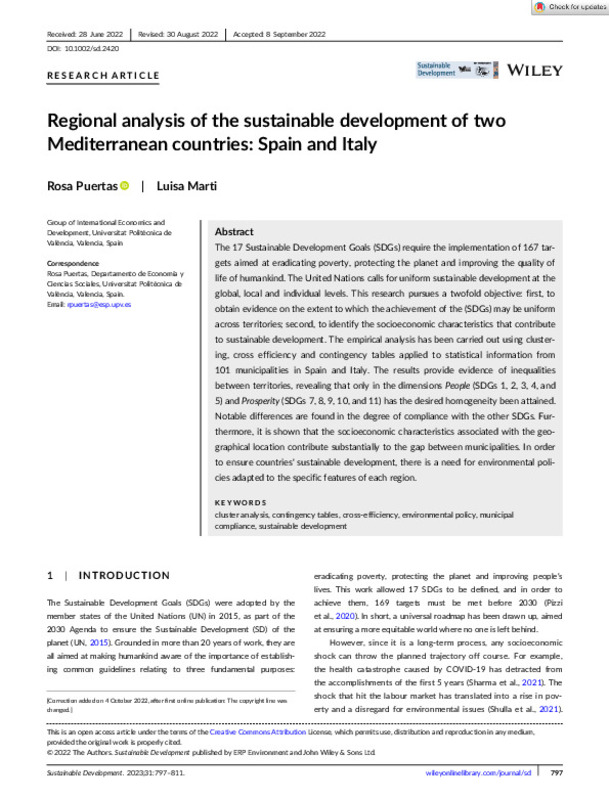JavaScript is disabled for your browser. Some features of this site may not work without it.
Buscar en RiuNet
Listar
Mi cuenta
Estadísticas
Ayuda RiuNet
Admin. UPV
Regional analysis of the sustainable development of two Mediterranean countries: Spain and Italy
Mostrar el registro sencillo del ítem
Ficheros en el ítem
| dc.contributor.author | Puertas Medina, Rosa María
|
es_ES |
| dc.contributor.author | Martí Selva, María Luisa
|
es_ES |
| dc.date.accessioned | 2023-10-05T18:01:26Z | |
| dc.date.available | 2023-10-05T18:01:26Z | |
| dc.date.issued | 2023-04 | es_ES |
| dc.identifier.issn | 0968-0802 | es_ES |
| dc.identifier.uri | http://hdl.handle.net/10251/197764 | |
| dc.description.abstract | [EN] The 17 Sustainable Development Goals (SDGs) require the implementation of 167 targets aimed at eradicating poverty, protecting the planet and improving the quality of life of humankind. The United Nations calls for uniform sustainable development at the global, local and individual levels. This research pursues a twofold objective: first, to obtain evidence on the extent to which the achievement of the (SDGs) may be uniform across territories; second, to identify the socioeconomic characteristics that contribute to sustainable development. The empirical analysis has been carried out using clustering, cross efficiency and contingency tables applied to statistical information from 101 municipalities in Spain and Italy. The results provide evidence of inequalities between territories, revealing that only in the dimensions People (SDGs 1, 2, 3, 4, and 5) and Prosperity (SDGs 7, 8, 9, 10, and 11) has the desired homogeneity been attained. Notable differences are found in the degree of compliance with the other SDGs. Furthermore, it is shown that the socioeconomic characteristics associated with the geographical location contribute substantially to the gap between municipalities. In order to ensure countries' sustainable development, there is a need for environmental policies adapted to the specific features of each region. | es_ES |
| dc.language | Inglés | es_ES |
| dc.publisher | John Wiley & Sons | es_ES |
| dc.relation.ispartof | Sustainable Development | es_ES |
| dc.rights | Reconocimiento (by) | es_ES |
| dc.subject | Cluster analysis | es_ES |
| dc.subject | Contingency tables | es_ES |
| dc.subject | Cross-efficiency | es_ES |
| dc.subject | Environmental policy | es_ES |
| dc.subject | Municipal compliance | es_ES |
| dc.subject | Sustainable development | es_ES |
| dc.subject.classification | ECONOMIA APLICADA | es_ES |
| dc.title | Regional analysis of the sustainable development of two Mediterranean countries: Spain and Italy | es_ES |
| dc.type | Artículo | es_ES |
| dc.identifier.doi | 10.1002/sd.2420 | es_ES |
| dc.rights.accessRights | Abierto | es_ES |
| dc.contributor.affiliation | Universitat Politècnica de València. Facultad de Administración y Dirección de Empresas - Facultat d'Administració i Direcció d'Empreses | es_ES |
| dc.description.bibliographicCitation | Puertas Medina, RM.; Martí Selva, ML. (2023). Regional analysis of the sustainable development of two Mediterranean countries: Spain and Italy. Sustainable Development. 31(2):798-811. https://doi.org/10.1002/sd.2420 | es_ES |
| dc.description.accrualMethod | S | es_ES |
| dc.relation.publisherversion | https://doi.org/10.1002/sd.2420 | es_ES |
| dc.description.upvformatpinicio | 798 | es_ES |
| dc.description.upvformatpfin | 811 | es_ES |
| dc.type.version | info:eu-repo/semantics/publishedVersion | es_ES |
| dc.description.volume | 31 | es_ES |
| dc.description.issue | 2 | es_ES |
| dc.relation.pasarela | S\471974 | es_ES |
| dc.contributor.funder | Universitat Politècnica de València | es_ES |








